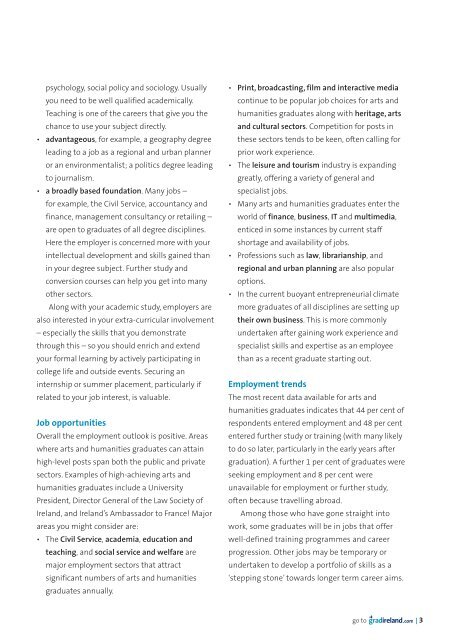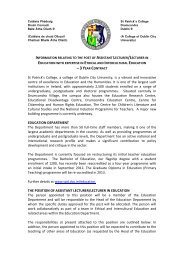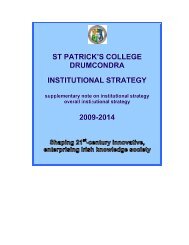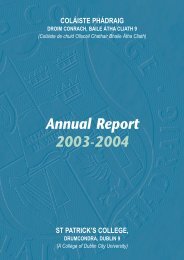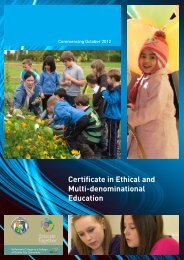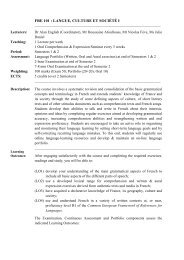Careers for Arts, Humanities and Social Science Graduates
Careers for Arts, Humanities and Social Science Graduates
Careers for Arts, Humanities and Social Science Graduates
Create successful ePaper yourself
Turn your PDF publications into a flip-book with our unique Google optimized e-Paper software.
psychology, social policy <strong>and</strong> sociology. Usually<br />
you need to be well qualified academically.<br />
Teaching is one of the careers that give you the<br />
chance to use your subject directly.<br />
• advantageous, <strong>for</strong> example, a geography degree<br />
leading to a job as a regional <strong>and</strong> urban planner<br />
or an environmentalist; a politics degree leading<br />
to journalism.<br />
• a broadly based foundation. Many jobs –<br />
<strong>for</strong> example, the Civil Service, accountancy <strong>and</strong><br />
finance, management consultancy or retailing –<br />
are open to graduates of all degree disciplines.<br />
Here the employer is concerned more with your<br />
intellectual development <strong>and</strong> skills gained than<br />
in your degree subject. Further study <strong>and</strong><br />
conversion courses can help you get into many<br />
other sectors.<br />
Along with your academic study, employers are<br />
also interested in your extra-curricular involvement<br />
– especially the skills that you demonstrate<br />
through this – so you should enrich <strong>and</strong> extend<br />
your <strong>for</strong>mal learning by actively participating in<br />
college life <strong>and</strong> outside events. Securing an<br />
internship or summer placement, particularly if<br />
related to your job interest, is valuable.<br />
Job opportunities<br />
Overall the employment outlook is positive. Areas<br />
where arts <strong>and</strong> humanities graduates can attain<br />
high-level posts span both the public <strong>and</strong> private<br />
sectors. Examples of high-achieving arts <strong>and</strong><br />
humanities graduates include a University<br />
President, Director General of the Law Society of<br />
Irel<strong>and</strong>, <strong>and</strong> Irel<strong>and</strong>’s Ambassador to France! Major<br />
areas you might consider are:<br />
• The Civil Service, academia, education <strong>and</strong><br />
teaching, <strong>and</strong> social service <strong>and</strong> welfare are<br />
major employment sectors that attract<br />
significant numbers of arts <strong>and</strong> humanities<br />
graduates annually.<br />
• Print, broadcasting, film <strong>and</strong> interactive media<br />
continue to be popular job choices <strong>for</strong> arts <strong>and</strong><br />
humanities graduates along with heritage, arts<br />
<strong>and</strong> cultural sectors. Competition <strong>for</strong> posts in<br />
these sectors tends to be keen, often calling <strong>for</strong><br />
prior work experience.<br />
• The leisure <strong>and</strong> tourism industry is exp<strong>and</strong>ing<br />
greatly, offering a variety of general <strong>and</strong><br />
specialist jobs.<br />
• Many arts <strong>and</strong> humanities graduates enter the<br />
world of finance, business, IT <strong>and</strong> multimedia,<br />
enticed in some instances by current staff<br />
shortage <strong>and</strong> availability of jobs.<br />
• Professions such as law, librarianship, <strong>and</strong><br />
regional <strong>and</strong> urban planning are also popular<br />
options.<br />
• In the current buoyant entrepreneurial climate<br />
more graduates of all disciplines are setting up<br />
their own business. This is more commonly<br />
undertaken after gaining work experience <strong>and</strong><br />
specialist skills <strong>and</strong> expertise as an employee<br />
than as a recent graduate starting out.<br />
Employment trends<br />
The most recent data available <strong>for</strong> arts <strong>and</strong><br />
humanities graduates indicates that 44 per cent of<br />
respondents entered employment <strong>and</strong> 48 per cent<br />
entered further study or training (with many likely<br />
to do so later, particularly in the early years after<br />
graduation). A further 1 per cent of graduates were<br />
seeking employment <strong>and</strong> 8 per cent were<br />
unavailable <strong>for</strong> employment or further study,<br />
often because travelling abroad.<br />
Among those who have gone straight into<br />
work, some graduates will be in jobs that offer<br />
well-defined training programmes <strong>and</strong> career<br />
progression. Other jobs may be temporary or<br />
undertaken to develop a portfolio of skills as a<br />
‘stepping stone’ towards longer term career aims.<br />
go to | 3


